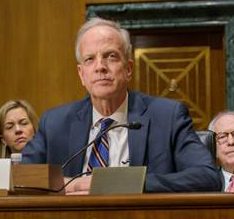By LESLIE EIKLEBERRY
Salina Post
SALINA — After a brief free trade presentation by Americans for Prosperity, U.S. Sen. Jerry Moran, R-Kan., spoke with constituents during a Salina town hall meeting Wednesday.
The event was held at the Webster Conference Center just north of Salina.
Moran addressed the current tariff wars the Trump administration recently has been involved in, noting agriculture is in the crosshairs in such battles as it is the easiest area in which another country can retaliate.
Moran acknowledged the $12 billion announced by the Trump administration for emergency aid for farmers affected by the tariff wars, however, he said the losses to agriculture, including agriculture in Kansas, will be significantly more than $12 billion.
He explained that the United States spent a great deal of money and effort to build up agriculture markets. With the tariffs in place now, customers from other countries are seeking agriculture-related goods elsewhere.
“The $12 billion will not solve the problems of the future,” he said.
Moran said he has encouraged the Trump administration to narrow the scope of tariff battles and focus on dealing with China. As it is, some of the countries who could have been U.S. allies in dealing with China also face tariff sanctions.
“Where we get a chance at profitability in agriculture is very much related to who we sell to around the globe,” he said.
Moran said that as a senator representing Kansas, he takes every opportunity to deliver to the president and administration the message that “at the end of the day, we have to have the opportunity to export or we will not earn a living in Kansas.”
Moran said that he has had, over the years of representing Kansans, even farmers who would tell him “let’s forget the rest of the world. Let’s just take care of ourselves and it would be much simpler, much easier than dealing with the rest of the world.”
“A lot of truth, perhaps, to the easiness of that, but for example, if we don’t export wheat, a pretty important commodity, a pretty important way that we earn a living, the question then becomes what 48 percent of acres that are now planted to wheat in Kansas do we no longer plant and do we no longer grow and do we no longer harvest and do we no longer get the income for?”
Moran also discussed manufacturers, especially small manufacturers, who use aluminum and steel. He said the tariffs imposed by the U.S. are causing a number of manufacturers to no longer be competitive in their particular markets because the tariffs mean their products cost more.
“We need to make certain we have trade. We need to make certain we reach agreements, and we need to get out of a tariff battle in order for Kansas to have a future,” he said.
During the gathering, a woman in the audience asked Moran why the U.S. doesn’t trade with Cuba. Moran said that while he doesn’t believe that the U.S. should subsidize sales to Cuba, he does believe that if Cuba has the money to buy goods from the U.S., the U.S. should be able to sell those goods to Cuba.
Moran said he got interested in trade with Cuba when he was researching and seeking out new markets for Kansas goods. He said he believes that not only would trade with Cuba benefit Kansas, but it also would help create freedoms for Cuban citizens. Moran explained Kansas goods would help to increase the standard of living for Cubans, and when that happens, the Cuban people would start asking for more freedoms.
In response to a question, Moran said he was puzzled to find an adequate word to describe the situation between the U.S. and Canada. He noted the Constitution provided the legislative arm of government with the ability to deal with trade with other countries, but that over the years, that ability was transferred to the executive branch. Moran said Congress has made a less-than-adequate attempt to take back that authority.
Moran said he and others in Congress were working hard to reverse the direction the Trump administration has the U.S. heading regarding tariffs.
“A significant part of what I am about is how to keep rural America alive and well,” he said.
While the trade focus is on immediate consequences, Moran said he was more concerned about longterm issues, including who will be there to farm Kansas farms. He said young people now are making decisions about helping with and carrying on family farming operations based on circumstances currently affecting farming operations.
In response to another question, Moran said he expected Supreme Court nominee Brett Kavanaugh to be confirmed, probably before the November election.
